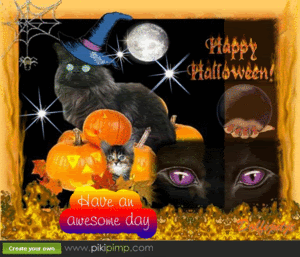 Did the citizens of colonial America celebrate Halloween? The answer is yes, but not in the way you may think. An historian with Colonial Williamsburg points out just how different Halloween was for our colonial ancestors:
Did the citizens of colonial America celebrate Halloween? The answer is yes, but not in the way you may think. An historian with Colonial Williamsburg points out just how different Halloween was for our colonial ancestors:With the arrival of European immigrants to the United States of America, came the varied Halloween customs indigenous to their former homelands. However, due to the rigid Protestant beliefs which characterized early New England, celebration of Halloween in colonial times was extremely limited in that particular area of the country. Halloween festivities were much more common in Maryland and the colonies located in the South. As the customs practiced by these varied European ethnic groups meshed with traditions employed by the native American Indians, a distinctly American version of Halloween began to emerge.
The first celebrations included "play parties," public events held to celebrate the harvest. At these gatherings, neighbors would share stories of the dead, predict each others' fortunes, sing and make merry with dancing. Colonial Halloween festivities also featured the telling of ghost stories and general mischief-making of all kinds. By the middle of the 19th Century, annual Autumn festivals were quite common, but Halloween was still not yet celebrated throughout the entire country.
During the second half of the 19th Century, America became flooded with a new wave of immigrants. These new arrivals...especially the millions of Irish nationals who were fleeing from the Potato Famine of 1846...helped greatly in popularizing the celebration of Halloween on a country-wide level. Taking from Irish and English traditions, Americans began to don costumes and journey from house-to-house asking for food or money (the probable forerunners of today's "trick-or-treaters"). Young women held the belief that they could divine the name or appearance of their future husband by performing tricks with yarn, apple peelings or mirrors.

1 comment:
The astrological/astronomical origins of Halloween are quite ancient. The holiday is just one of what is known as the four "cross-quarter days." Here's more information on Halloween from Astronomy Site - Barbara Melville (BellaOnline's Astronomy Editor)
Halloween's Astronomical Origins
Guest Author - Lea Terry
What images does the word “Halloween” conjure up? Witches? Ghosts? Goblins? The Day of the Dead? Actually, Halloween has an astronomical origin--dating back to the Celts, who lived in pre-Christian Britain.
Halloween is a “cross-quarter day,” observed by the Celts, and by traditional Japanese Shinto societies. Both cultures [along with American Indian culture] recognized the equinoxes and the solstices as the middle of the season, and marked the beginning of the seasons by four cross-quarter days (the Celtic names follow): February 1, or Imbolc, May 1, called Beltane, August 1, Lughnasad, and November 1, or Samhain. The cross-quarter days fell between the quarter days marked by the Sun: the winter solstice, or the longest night of the year, the spring equinox, with equal night and day, the summer solstice, or the longest day of the year, and the autumnal equinox, with equal day and night. The traditional cross-quarter days are still observed, although now they’re called Groundhog Day, May Day, Lammas Day (celebrated on August 1, Lammas Day is a harvest holiday that’s not well-known), and Halloween.
The Celts called Halloween “Samhain,” or “summer’s end” and it was also their New Year’s Eve. By this time, the crops had been harvested, the animals brought in, and people had settled in for the winter. November 1 was All Saints Day, a time to remember the dead, and the night before was Halloween, or All Hallows Eve. The Celts believed that at this time, the veil between the worlds of the living and the dead was its thinnest, and that the departed, especially those who had died within the previous year, might return to their former homes for a visit. Villagers put out offerings of food and drink to aid these otherworldly travelers on their journey--a precursor to today’s trick-or-treat tradition. Many of the modern-day Halloween traditions, in fact, descend from ancient Celtic rituals used to commemorate this day, a day that originally marked the cycle of the seasons.
Post a Comment